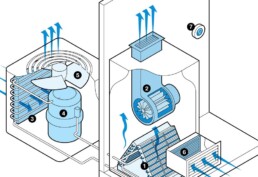Why do Compressors Fail?
On most days, our HVAC systems run like a well-oiled machine. All components working together seamlessly to keep your home cool and comfortable. What happens when one of those components stops working—specifically the compressor?
Essentially the heart of your HVAC system, the compressor is located in your outdoor unit. It works hard to circulate the refrigerant through the coils of your unit while also applying energy to the coolant. Without a working compressor, your home will not have cool air. During the Spring/Summer season, especially in Florida, the compressor works overtime to keep your home air conditioned.
There are several factors that can cause the compressor in your HVAC unit to fail.
• Lack of Lubricant
• Overheating- This can be caused by dirty coils, low suction pressure or a low charge.
• Electrical Issues
• Bad Capacitor
• Low Voltage
• Electrical Spike
Signs of compressor issues include: an odd noise at the start-up of your HVAC unit, ice on the coils or loss of cool air in your home. If you start experiencing any of these issues, contact your local comfort experts at Air Conditioning & Heating, Inc. immediately. Your HVAC system cannot run efficiently and effectively without it’s heart.
How an AC Works
- Evaporator - Cooling coils remove heat and humidity from the air using refrigerant.
- Blower - A blower (fan) circulates air over the evaporator, dispensing the chilled air.
- Condenser - Hot coils release collected heat into the outside air.
- Compressor - A pump that moves refrigerant between the evaporator and the condenser to chill the indoor air.
- Fan - A fan blows air over the condenser to dissipate the heat outside.
- Filter - Located in the air conditioning unit to remove particles from the air.
- Thermostat - A control system to regulate the amount of cool air that is distributed.
